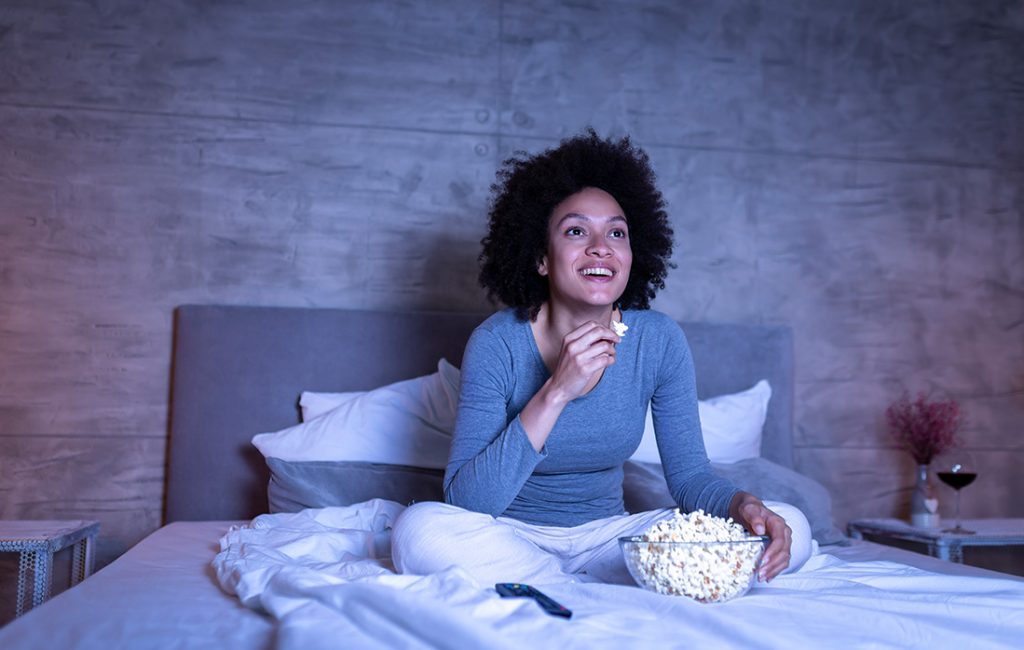
There’s nothing like tossing and turning all night, only to realize that what was bothering you all night was that stray piece of popcorn that was left on the bed. It turns out, a new survey of 2,000 people conducted by Serta Simmons Bedding, reveals that crumbs in your bed are one of the greatest disruptors of sleep. It also showed that we aren’t so forgiving when it comes to partners disrupting our sleep. In fact, we can be so against our partners getting crumbs in their bed, that a third would reconsider the entire relationship over crumb makers. Thirty-eight percent of millennials said they’d end a relationship over that issue, but they also are the generation most apt to snacking where they sleep.
Sleep disturbances aren’t just isolated to those with snacking partners, but impact up to a third of US adults, who get less than the recommended amount of sleep each night. The Centers for Disease Control and Prevention (CDC) reminds us that getting enough sleep isn’t a luxury, it’s a necessity for optimal health. Sleep issues are linked to vehicle accidents and workplace errors, and chronic conditions like Type 2 diabetes, depression, obesity and more.
Serta Simmon’s Bedding’s survey pointed to additional sleep disturbances, and noted that 21 percent of respondents hadn’t had a “perfect” night’s sleep in over a month. Kids are waking up parents around twice per week for bathroom help or nightmares, and pet owners aren’t exempt either.
“Barks/meows or whimpers” accounted for twice per week disruptions for around 1 in 3 respondents, as did pets needing to go outside. Nothing like a midnight jaunt to the lawn to ruin a cozy night’s sleep. And though pets don’t go “back to school,” kids sure do, and parents sleep 50 percent better and longer as well, when that magical day comes.
JD Velilla, Head of Sleep Experience at Serta Simmons Bedding, has personally transformed his bedroom into a quiet space and even has mastered waking refreshed without an alarm clock. He says he was surprised by the generational differences in the study, but also the geographical ones: people in the northeast are more likely to wake when they’re hot, at 89 percent, while their friends to the South are disrupted just 61 percent of the time by heat. In addition to sleeping in a cool environment, Velilla points to the simple habit of making your bed each morning as a key factor in better sleep the next night.
“Seventy-four percent of those surveyed said they sleep better crawling into a neatly made bed at night, with that number rising to 77 percent among Millennials, ages 26-41,” he says, adding that if heat continues to add to discomfort, try more breathable linens and lighter clothing. He also says to stick to consistent bedtime routines, and choose easy-to-digest (and not so messy!) snacks if you are hungry before bed. His go-tos are fruit, or yogurt with granola. Fifty percent of people admitted to eating before bed, and Velilla notes that bedtime might trigger cravings, but heavy eating before bed can interrupt sleep as you digest.
While it might seem like some little crumbs wouldn’t impact you much, another study shows that interrupted sleep resulted in a 31 percent reduction in positive moods the next day, an issue that persists even days later. Digging into your biggest disruptors, and taking meaningful steps to minimize them, just might lead to a much happier day, and a less grumpy partner too.


























